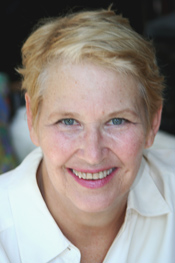Annie Dillard
| Annie Dillard | |
|---|---|

Portrait by Phyllis Rose
|
|
| Born | Meta Ann Doak April 30, 1945 Pittsburgh, Pennsylvania, U.S. |
| Occupation | Writer |
| Nationality | American |
| Period | 1974–present |
| Genre | Nonfiction, fiction, poetry |
| Notable works | Pilgrim at Tinker Creek; Holy the Firm; For the Time Being; An American Childhood; The Maytrees |
| Notable awards |
Pulitzer Prize for General Nonfiction 1975 – Pilgrim at Tinker Creek |
| Website | |
| www |
|
Annie Dillard (born April 30, 1945) is an American author, best known for her narrative prose in both fiction and non-fiction. She has published works of poetry, essays, prose, and literary criticism, as well as two novels and one memoir. Her 1974 work Pilgrim at Tinker Creek won the 1975 Pulitzer Prize for General Nonfiction. Dillard taught for 21 years in the English department of Wesleyan University, in Middletown, Connecticut.
Annie Dillard was the eldest of three daughters in her family. Early childhood details can be drawn from Annie Dillard's autobiography, An American Childhood (1987), about growing up in the Point Breeze neighborhood of Pittsburgh. It starts in 1950 when she was five. Dillard's memoir An American Childhood focuses on "waking up" from a self-absorbed childhood, and becoming immersed in the present moment of the larger world. She grew up in Pittsburgh in the 50s in "a house full of comedians." She describes her mother as an energetic non-conformist. Her father taught her many useful subjects such as plumbing, economics, and the intricacies of the novel On the Road, though by the end of her adolescence she begins to realize neither of her parents is infallible. In the autobiography she describes reading a wide variety of subjects including: geology, natural history, entomology, epidemiology, and poetry, among others. Influential books from her youth were: The Natural Way to Draw and Field Book of Ponds and Streams. as they allowed her a way to interact with the present moment, and a way of escape respectively. Her days were filled with exploring, piano and dance classes, rock collecting, bug collecting, drawing, and reading books from the public library including natural history and military history, such as World War II.
As a child, Dillard attended the Shadyside Presbyterian Church in Pittsburgh, though her parents did not attend. She spent four summers at the First Presbyterian Church (FPC) Camp in Ligonier, Pennsylvania. As an adolescent she quit attending church because of "hypocrisy." When she told her minister of her decision, she was given four volumes of C. S. Lewis's broadcast talks, from which she appreciated that author's philosophy on suffering, but elsewhere found the topic inadequately addressed.
...
Wikipedia
